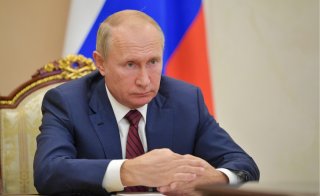Russia Sides with Israel’s Mortal Enemies
Moscow is reverting to its old, Soviet-style anti-Israel and anti-Western stance in the Middle East.
Israel has received over 40,000 Ukrainian refugees and provided specialized medical care, including for Ukrainian amputees. “Despite what the Kremlin says, Nazi sympathy is not an issue in Ukraine,” said Michael Brodsky, Israel’s ambassador in Kyiv, in an interview. However, other Israeli diplomats note that Israel is not planning to supply arms to Ukraine, at least not as long as the hostilities with Hamas and Hezbollah continue.
With Netanyahu’s political future looking bleaker by the hour, it is too early to tell what Israel’s policy towards Russia and Ukraine will look like. Still, the need to increase coordination and cooperation with the United States and Europe, coupled with the growing anti-Putin and pro-Ukraine public sentiment, will likely sour Jerusalem-Moscow relations further.
“Israel will do what it has to do to protect itself, not just in Gaza, but in Lebanon and Syria, and, if necessary, against the Iranian homeland,” says a senior Israeli diplomat. “Iranian IL-76 transport planes are landing in the Russian air base in Khmeimim in Syria. What are they bringing there, and for whom? We shot down Russian pilots over Egypt in 1970 and destroyed Russian-designed Syrian massive anti-aircraft systems in the Beqa’a Valley in 1982. Hope Russia won’t force us to take similar steps again. I want to believe in their common sense.”
Much will depend on the levels of Russia’s support to militant Islamists, yet it looks like Moscow is reverting to its old Soviet-style hard-core anti-Israel and anti-Western stance in the Middle East. The de-facto alliance with Iran against Israel, the moderate Arab states, and the United States may make things worse, not better, as Putin discards any pretense of balance.
Dr. Ariel Cohen is a nonresident senior fellow at the Atlantic Council’s Eurasia Center and a member of the Council of Foreign Relations. He is a recognized authority on international security and energy policy and a leading expert in Russia, Eurasia, and the Middle East. Cohen is also a managing director of the Energy, Growth, and Security Program (EGS) at the International Tax and Investment Center (ITIC).
Image: Aynur Mammadov / Shutterstock.com.

